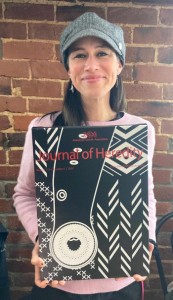
The Council of the American Genetic Association has reached a decision regarding the Journal of Heredity Outstanding Student-Authored Paper Award for manuscripts published during 2022. This year, eight articles in Volume 113 that were first-authored by a student were considered, and the award presented to Allison Miller for her paper, Population genomics of New Zealand pouched lamprey (kanakana; piharau; Geotria australis) (Allison K Miller, Nataliya Timoshevskaya, Jeramiah J Smith, Joanne Gillum, Saeed Sharif, Shannon Clarke, Cindy Baker, Jane Kitson, Neil J Gemmell, Alana Alexander). JHered 2022. 113-4, pp 380-397.
The evaluation committee had the following comments on this top-ranked article:
"Well-written manuscript, with clear goals, good geographic and genomic sampling, and thoughtful discussion with clearly articulated conservation management implications.”
Allison will receive a $2,000 prize, a certificate, and up to $1,500 toward expenses to attend and present a talk at the 2024 AGA President’s Symposium.
For more about this study and its significance, see Allison's post in the AGA Blog:
https://blog.theaga.org/behind-the-science-lessons-from-lamprey/
Biography:
Allison K. Miller is a conservation geneticist and soon-to-be PhD graduate from the University of Otago. Her thesis work focused on assessing the use of genomic tools to better understand, and improve the management of, elusive species by using pouched lamprey as a case study. Prior to this work she studied coral reef ecology at the University of Guam where her master’s thesis research focused on holothuroid (sea cucumber) phylogenetics. She then worked as a biological technician for the US National Park Service in Guam and is currently working as a natural science curator at the Otago Museum.

Check out our Editor's Choice article by Zimmerman et al., examining the great plains bison at American Prarie, while our cover this issue is courtesy of Winter et al., who lay out the best assembly yet of the beautiful Ural owl
AGA member have elected a new President and Councilors.
Jeff Good
Katie Lotterhos
Al Roca
Christine Edwards
Klaus-Peter Koepfli
Michael Russello
Nevé Baker
Apply now for an AGA
Any questions? Contact the Managing Editor at theaga@theaga.org.